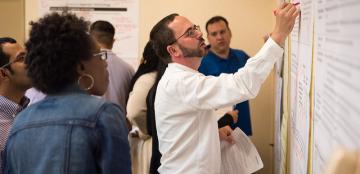
Dana Center Mathematics Pathways Expands Impact With “Deep Dive” Work in Four States
The Dana Center Mathematics Pathways (DCMP) initiative has expanded its impact through extended work collaborations with higher education systems and institutions in four states: California, North Carolina, Georgia and Maine. With the addition of these new collaborations, the DCMP has guided the development of mathematics pathways in over 30 states since the project began in 2012.
Mathematics pathways are a rapidly growing national movement in colleges and universities to align math courses more closely to students’ intended majors and future careers, and to accelerate students’ successful completion of their first college-level math course. Earning credit in a gateway math course is a critical milestone in the completion of a certificate or degree, but national data show that less than 10% of students complete a gateway college math course within two years. The content of the most common math courses does not align with students’ future careers. The Dana Center has taken up the challenge of replacing existing models of entry-level math programs with new mathematics pathways that propel students to degrees, postsecondary certifications, and stronger career placements.
The DCMP works with states and regions to implement large-scale, systemic change using a variety of strategies. The four newest collaborations will engage higher education institutions representing hundreds of thousands of students:
- Using a process and resources developed by the DCMP, California’s Central Valley Higher Education Consortium (CVHEC) convened a mathematics task force last fall to set a vision for modernizing entry-level mathematics pathways. Task force members are now moving into an implementation phase. The DCMP process empowers and supports faculty to lead the work, collaborate across institutions, and engage with other stakeholders. The task force members represent 19 two- and four-year institutions in California’s Central Valley.
- The University of North Carolina (UNC) System launched a math task force in April to design and establish effective mathematics pathways. The task force is charged with developing rigorous courses aligned to programs of study, examining placement criteria and improving transfer and applicability of math credits. The UNC System comprises all 16 public universities in the state as well as the North Carolina School of Science and Mathematics. The task force will also engage with the state’s community college and K–12 school systems.
- The DCMP is again collaborating with the University System of Georgia (USG) – representing 28 institutions of public higher education – to deepen implementation of “co-requisite” math courses to support faculty in considering the creation of a new, statistics-oriented mathematics pathway, and to align the math pathways to programs. The DCMP is a partner in USG’s “Momentum Year” initiative funded through the Strong Start to Finish collaborative. USG was one of the first systems to work with the DCMP, pioneering the establishment of math pathways in the state.
- In Maine, the DCMP is working with the Maine Community College System (MCCS) to support systemwide implementation of math pathways. The DCMP will advise a faculty team to develop learning outcomes for gateway math courses, and will facilitate workshops and customized technical assistance on implementing math pathways and designing co-requisite courses.
According to Dr. Martha Ellis, the Charles A. Dana Center’s director of higher education strategy, policy, and services, “The DCMP has an established history of providing extremely effective, experience-based services to systems and institutions, of all sizes, who wish to use mathematics pathways to give their students more equitable access to highly effective math education.” Ellis continues, “We are excited to bring our experience to bear in working with these colleges and universities to better support the success of their most vulnerable student populations.”
For more information, please contact:
Erich Pelletier
Communications Coordinator, The Charles A. Dana Center
The University of Texas at Austin
Get in Touch
How can the Dana Center work with you to ensure that our nation's students are ready for postsecondary education and the contemporary workforce?
